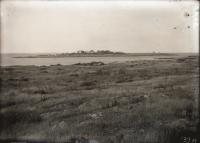
Wabanaki beaded purse, ca. 1870
Hudson Museum, Univ. of Maine
Biddeford's earliest inhabitants have many names. Wabanaki/Abenaki, or "People of the Dawn", is the generic term for Maine tribes, and usage dates from the 18th century. The French called the ethnic group of southwestern Maine “Armouchiquois“, but the tribes often referred to themselves by their family band name. The tribes associated with the Saco River valley were the Pequawket or Pigwacket tribe based on the headwaters of the Saco in the Fryeburg area (northern Saco River) and the Sokoki or Saco who lived along and on the southern part of the Saco River in Cumberland and York Counties.

Purse with fabric woven by Mali Agat, ca. 1785
Maine Historical Society
The Sokokis/Saco main village is thought to be Sowocatuck, where modern day downtown Biddeford and Saco now stand, in the areas around the great falls. All of these tribal names are found in the early literature of the area, as well as the southern New England tribes' names for the Wabanakis -- Tarrentines/Tarrateens, which was used by some of the earliest English explorers and settlers.

Birch bark box by Mali Agat, ca. 1770
Maine Historical Society
Whatever the name, these people lived along the Saco River for thousands of years - fishing its waters, canoeing to the headwaters each summer, and living in villages farther up river each winter. They planted beans, corn, and squash and hunted deer and other wild game as well. Occasionally they warred with other tribes along their frontiers, but these would end after a time. Their numbers were difficult to determine: they relocated by season and often abandoned the villages built. A “fluid patrilineal social organization allowed numerous family band affiliations and frequent migrations between villages.” (Ghere, 513)

Wood Island and lighthouse, Biddeford Pool, ca. 1915
McArthur Public Library
Their doom was just over the horizon, with the coming of the white settlers and more importantly the wars those settlers would bring across the sea with them from the Old World. However poorly Maine's native peoples faired after contact with Europeans, only the southwestern tribes would disappear altogether--driven from their ancestral lands to disappear among the tribal bands to the north and east; their culture and customs only to be puzzled out through the archaeological record and the writings of the earliest explorers, settlers, and missionaries.